As a homeopathic practitioner, I've often encountered a phrase that used to puzzle me: "Follow up not given."
Why would someone invest time and money in a
homeopathic consultation and then vanish? Why wouldn't they return to discuss
the results?
It
turns out, there are reasons on both sides of the equation. Let's explore why
patients might skip follow-ups, and why these visits are crucial in homeopathy.
From the Patient's Perspective:
Feeling No Change: Perhaps the initial remedy hasn't produced an obvious improvement. Remember, our memories of pain can be fleeting. We forget how bad things were!
·
Worsening Symptoms: Sometimes, a
remedy can trigger a temporary worsening of symptoms before improvement sets
in. This can be alarming, leading patients to avoid follow-up.
·
Feeling Great! In the best-case scenario, the remedy
works wonders, and patients feel they no longer need treatment.
Why
Homeopaths Need Follow-Ups:
1.
Evaluating the Remedy's Effectiveness:
A
homeopath needs your feedback! Without follow-up discussions, it's difficult to
assess if the chosen remedy is working, needs adjustment, or should be replaced
entirely.
2.
Understanding Your Experience:
Did
the remedy cause any side effects? Are there subtle improvements you might have
overlooked? A detailed discussion helps the homeopath understand the full
picture.
3.
Refining the Treatment Plan:
Based
on your response, the homeopath might modify the dosage, potency, or even
prescribe a different remedy altogether.
4.
Building a Long-Term Relationship:
Homeopathy
is a journey, not a quick fix. Follow-ups allow the homeopath to support you in
addressing future health concerns.
So,
what can you do?
·
Communicate Honestly: Whether you feel
no change, a worsening, or a fantastic improvement, discuss it with your
homeopath.
·
Embrace the Process: Healing takes
time. Trust the process and work with your homeopath to achieve optimal
results.
And
to those considering skipping a follow-up:
It's
never too late to come back! Your health deserves this commitment.
Remember: Open communication
and regular follow-ups are the cornerstones of successful homeopathic
treatment. Let's work together to unlock your path to wellness!


Comments
Post a Comment